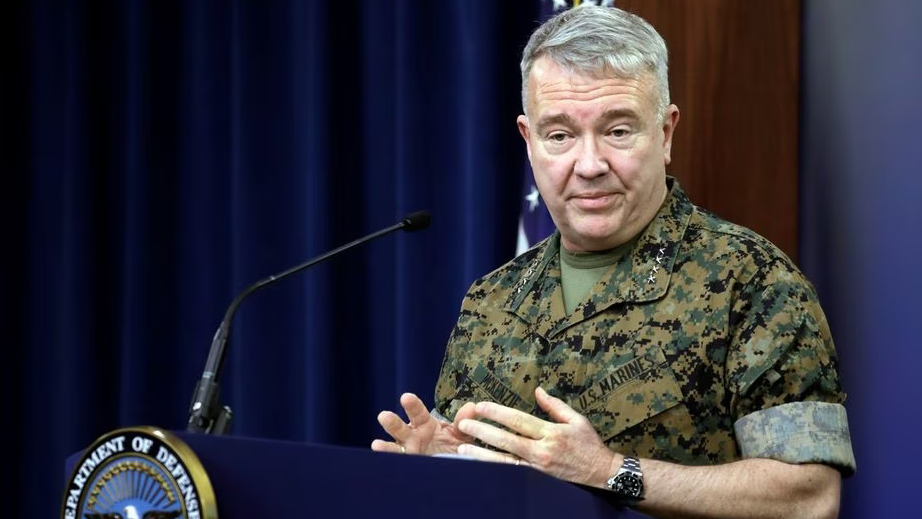Retired General Frank McKenzie, the former head of US Central Command (CENTCOM), says he has a lot of regrets about how the withdrawal from Afghanistan was handled and says the basic decision to pull out was “the wrong decision”.
In an interview with Fox News, McKenzie said: “I believe history is going to view the decision to come out of Afghanistan in the way that we did and the manner that we were directed to come out as a fatal flaw.”
McKenzie, who is now retired, was the commander of CENTCOM, the combatant command of the Middle East, from March 2019 to April 2022. He oversaw the largest evacuation in US history, evacuating an estimated 124,000 people from Afghanistan in August 2021.
“I have a lot of regrets about how it ended in Afghanistan. I have a regret with the basic decision, which I think was the wrong decision. And I particularly regret that we did not choose to begin to evacuate our people, our embassy personnel, our American citizens and our at-risk Afghans at the time we made the decision to bring in our combat forces. I think that was a serious mistake, and I think that led to the events of August 2021 directly,” McKenzie said.
“I have a lot of regrets about how it ended in Afghanistan. I have a regret with the basic decision, which I think was the wrong decision,” he said.
The chaotic withdrawal from Afghanistan, and a deadly suicide bombing outside the gates of the Kabul airport on August 26, 2021, has over the past few months been under investigation by the House Foreign Affairs Committee.
Spearheaded by Congressman Michael McCaul, the committee has been demanding answers to the evacuation, dissent cables and the bombing – which left over 150 people from Afghanistan dead as well as 13 American servicemembers.
Testifying before the committee in March this year, Sgt. Tyler Vargas-Andrews, a Marine sniper who lost limbs in the Abbey Gate bombing said he saw a person that matched the suicide bomber’s description but was told to not engage.
“Plain and simple, we were ignored,” Vargas-Andrews, who is now medically retired, told lawmakers.
However, McKenzie said: “There was no description of a bomber meeting the description that you just played that day or the day prior in and around Kabul.”
“We were dealing with the possibility of a suicide vest attack but without specific description of the person,” McKenzie said.
“We were dealing with a possibility of an indirect fire attack, either rockets or mortars,” he continued, “but I do know that there was no intelligence to support the assertion that we knew what the bomber looked like, that he was carrying a backpack with three yellow stripes. There were just none of that. We just did not have that intelligence.”
Chaotic scenes of thousands of people trying to get into the airport played out for over two weeks after the Taliban seized Kabul. As Afghanistan’s forces had fled, it became the Taliban’s job to provide security around the perimeter of the airport. But McKenzie said he does not regret cutting the deal.
“I feel had we not done so, our casualties would have been significantly higher,” he said.
Asked if he had intelligence the suicide bomber and members of ISIS-K were gathering at a hotel by the airport, McKenzie said there were a variety of targets that U.S. military leaders told the Taliban to take a look at.
“I further believe that other attacks were prevented by the fact that we had the Taliban operating outside the wire. And there was a downside to the Taliban being out there, too, in that people that we wanted to get through had trouble getting through. And that’s just the difficult equation you got to solve when you’re trying to balance force protection against the desire to get people out of Afghanistan, McKenzie said.
McKenzie said Abbey Gate, where the bombing took place, was open because it was one of the only locations the US could bring people in directly. The UK had asked the US to keep it open, so they did.
“Abbey Gate gave us the opportunity to bring people in, and we were trying to bring some final UK personnel,” McKenzie said. The UK personnel had been staying in a hotel just outside the airport.
McKenzie meanwhile believes the US should still have troops in Afghanistan and trusts the current CENTCOM commander’s assertion that ISIS-K (Daesh) has grown capable of carrying out an attack on US interests from within Afghanistan.
Asked what he could have done differently, McKenzie said, “You always look back any time you lose people and you wonder if you could have done things differently, and I am haunted by that. I think about it quite a bit. It’s one of the many regrets that I have. I examined everything we did. I think about it particularly in the month of August of every year for the rest of my life.”





